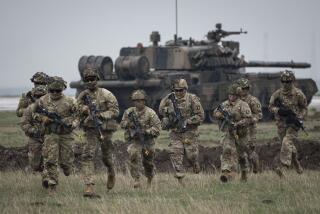NATO Chief Says Peacekeepers in Bosnia Will Fight if Necessary
- Share via
KNOKKE-HEIST, Belgium — U.S. Adm. Jeremy M. Boorda, the man who will lead more than 50,000 troops--about half of them Americans--in the Bosnian peacekeeping mission, declared here Friday that they will fight if necessary.
In tough remarks to a security conference, the four-star admiral indicated that his command--NATO’s Allied Forces Southern Europe--is ready to move into Bosnia-Herzegovina as soon as a peace treaty is concluded among Muslims, Serbs and Croats.
He said the reason that armed soldiers will be sent to Bosnia was to be ready for any necessary heavy combat in what would be the largest peacekeeping mission in modern times and NATO’s biggest in its 44-year history.
If there is no military threat in such a situation, Boorda said, “You send the Red Cross.”
Bosnian peacekeepers must be ready to face any threat, he told an audience of diplomats, officers and strategic experts on the North Atlantic Treaty Organization at this seaside resort.
“Our approach,” Boorda declared, “has to be bigger, tougher, stronger than they are. If we go to Bosnia, I don’t want to say ‘Mother, may I?’ to anyone. If we are given the task, our force must be free to move.”
Reports from Geneva and Sarajevo, the Bosnian capital, suggest that a peace treaty may be signed as early as next week, creating three ethnic ministates in Bosnia.
In any event, Boorda said his forces are ready and air cover is in place to protect them.
Current plans call for a Bosnian peacekeeping force of about 50,000 NATO troops, half of whom would be American. About 15,000 peacekeepers would come from non-NATO countries.
Boorda, whose headquarters is in Naples, Italy, called for “unity of command,” meaning that he would be in charge of the Bosnian peacekeeping force. “It will not work with more than one command structure in charge,” he said. “Most military operations are intense, inherently dangerous.”
The Bosnian peacekeeping forces are now under French and Belgian U.N. commanders, while Boorda is in charge of NATO air and sea forces in the Adriatic.
“We must be impartial in implementing the peace plan--and credible,” he said.
Two weeks ago, NATO Secretary General Manfred Woerner warned that NATO troops assigned to Bosnia must not be “humiliated.”
Boorda and Woerner are pursuing a tougher line than has been shown in the past, particularly among some NATO allies with troops in the former Yugoslav republics.
Boorda said that deployment of American and NATO troops to Bosnia was a “doable task with acceptable risk.”
The U.S. 1st Armored Division based in Germany is one of the major American units earmarked for service in a Bosnian peacekeeping mission.
Boorda said estimates of the length of time needed for the peacekeeping operation in the event of a settlement ranged up to two years.
And his mission, he concluded, would be to “try to create an environment to return to a sense of normalcy.”
More to Read
Sign up for Essential California
The most important California stories and recommendations in your inbox every morning.
You may occasionally receive promotional content from the Los Angeles Times.













